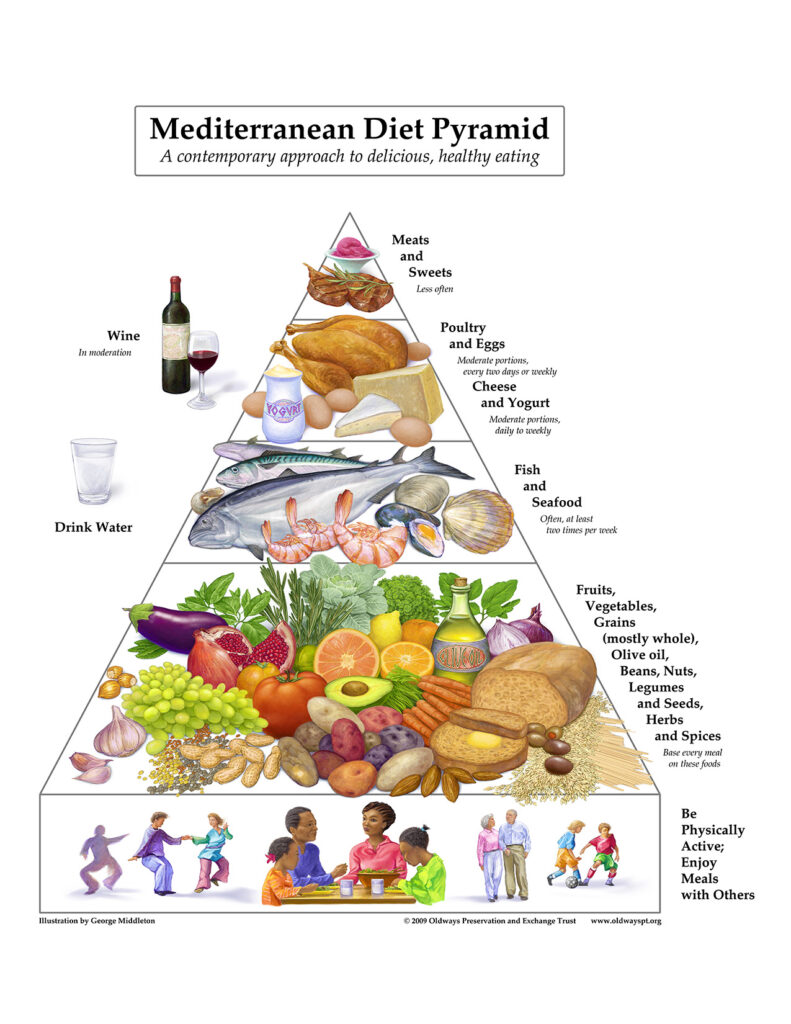
The Mediterranean way of eating has a strong emphasis on whole plant-based foods. It focuses on a variety of real foods including vegetables, fruits, whole grains, legumes (beans and lentils), nuts and seeds.
Extra-virgin olive oil is the main source of dietary fat due to its high content of monounsaturated fats. In addition, omega-3 fatty acids are emphasized.
The pyramid provides a visual for the Mediterranean diet. Notice the variety of foods and the variety of color. Also notice that the base of the pyramid has nothing to do with food at all. It describes a foundation, or emphasis, of social connections and physical activity.
The Research

The Mediterranean diet is the most researched diet and has been associated with improved overall health and decreases in chronic diseases.
Below is a summary of the research describing the benefits for cardiovascular disease (CVD).
Study 1
In 2013, a randomized control trial referred to as the PREDIMED study researched primary prevention of CVD with Mediterranean diet. The 7,447 participants were at high cardiovascular risk but did not have CVD at the time of enrollment in the study.
For approximately 5 years, the participants followed either the (1) Mediterranean diet supplemented with extra-virgin olive oil, (2) Mediterranean diet supplemented with mixed nuts or the (3) control diet with advice to reduce dietary fat.
The participants in either of the Mediterranean diets had a 30% reduction in cardiovascular events compared to the control group.
In addition, the researchers note that the more participants adhered to the Mediterranean diets, the further they reduced their risk of cardiovascular events compared to those within the control group.
Study 2
In 2022, a randomized control trial referred to as the CORDIOPREV study researched secondary prevention of CVD with Mediterranean and low-fat diet. The participants had coronary heart disease at the time of enrollment in the study.
For 7 years, the 1,002 participants followed either the (1) Mediterranean diet or the (2) low fat, high complex carbohydrate diet.
The participants following the Mediterranean diet had a 25-28% reduction in cardiovascular events compared to the low-fat diet. Men, who made up ~ 82% of the participants, realized the greatest reduction in cardiovascular events while the women remained relatively consistent between the two diets. Men (adjusted for diet, age, family history or coronary disease and smoking) had a nearly 33% reduction in cardiovascular events compared to those following the low-fat diet.
Study 3
Historically, woman have been underrepresented in research. The same is true when it comes to research involving the Mediterranean diet and CVD. Participants have been predominately men, as is the case within the CORDIOPREV research mentioned above, or the gender specific analysis has had mixed results.
In 2022, a systematic review and meta-analysis evaluated the primary prevention of CVD in women following a Mediterranean diet. The research included 16 observational studies that followed 722,495 women over a median follow-up of 12.5 years.
The study found that the Mediterranean diet lowered the risk of CVD by 24% and total mortality (death from all causes, cardiovascular or otherwise) by 23%. This study provides support that women also reduce their CVD risk significantly when following a Mediterranean diet.
Key Takeaway

All three of these studies reveal a 25-30% reduction in risk of CVD. That’s a big deal. A pretty significant reduction in risk.
Are you asking yourself how the heck do I get started on this Mediterranean diet thing?
Incorporating more real foods into your meals sounds doable. And, research aside, it makes sense that eating more real, whole foods would improve your health.
And then your brain begins to wander into the how. How do you make the transition from what you are eating today to the Mediterranean style of eating? You have been eating the same way for decades and your ingredients look nothing like those represented within the pyramid. Where do you start?
Do not fret. I have your back.
Heart Health Nutrition Program
Based upon the compelling research, the Heart Health Nutrition Program is focused on showing you practical ways to incorporate more and more real foods into your meals.
You do not need to face this challenge alone.
The self-paced course guides you to gradually add whole, real foods into your meals. Nutrition education. Recipes. Cooking videos. Tips and tricks to save time in the kitchen.
And you are supported along the way. Private FB group for questions. Monthly group Q&A sessions. Quarterly 1:1 health coaching sessions personalized for you.
Learn more about the Heart Health Nutrition Program HERE.
Wish to discover whether the Heart Health Nutrition Program is the program for you? Click HERE to schedule a complementary 30-minute conversation to find out more.
References:
Delgado-Lista, J., Alcala-Diaz, J.F., Torres-Peña, J.D., Quintana-Navarro, G.M., Fuentes, F., Garcia-Rios, A.,…Lopez-Miranda, J. (2022). Long-term secondary prevention of cardiovascular disease with a Mediterranean diet and a low-fat diet (CORDIOPREV): A randomised controlled trial. Lancet, 399, 1876-1885. doi: 10.1016/S0140-6736(22)00122-2
Estruch, R., Ros, E., Salas-Salvadó, J., Covas, M.I., Corella, D., Arós, F.,…Martínez-González, M.A. (2018). Primary prevention of cardiovascular disease with a Mediterranean diet supplemented with extra-virgin olive oil or nuts. New England Journal Of Medicine, 378(25):e34(1)-(14). doi: 10.1056/NEJMoa1800389
Pant, A., Gribbin, S., McIntyre, D., Trivedi, R., Marschner, S., Laranjo, L.,…Zaman, S. (2023). Primary prevention of cardiovascular disease in women with a Mediterranean diet: Systematic review and meta-analysis. Heart, 109(16), 1208-1215. doi: 10.1136/heartjnl-2022-321930
